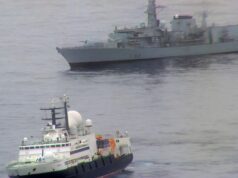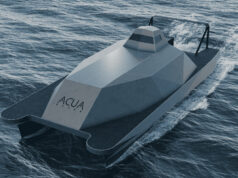
BAE have indicated in their annual report that a ‘No’ vote in Scotlands upcoming independence referendum would help create “greater certainty and stability” for their business. The defence giant joins a list of companies including Standard Life, Royal Bank of Scotland, Shell, Lloyds and Barclays in highlighting the risks associated with the September vote.
Their annual report states:
“In September 2014, Scotland will hold an independence referendum.
The decision on independence from the UK is a matter for the people of Scotland. However, BAE systems has significant interests and employees in Scotland, and it is clear that continued union offers greater certainty and stability for our business.
In the event that Scotland voted to become independent, we would need to discuss the way forward with the Ministry of Defence and UK Government, and work with them to deliver the best solution in those circumstances.”
It is understood that the United Kingdom does not and politically cannot build complex warships overseas.
A Better Together (the anti-independence campaign) spokesman welcomed the news: “This is an important intervention from one of Scotland’s largest employers and underlines the huge risks involved with leaving the UK. The defence industry employs thousands of people in Scotland because we are part of the UK. If we walk away from the UK then we walk away from the UK investment that sustains the jobs of so many communities throughout Scotland. The UK Government has never built a warship outside of the UK. The idea that we could leave the UK but UK warships would continue to be built here simply isn’t credible. Alex Salmond may think that thousands of shipyard jobs are a price worth paying to achieve his lifelong dream of independence, but most people in Scotland don’t agree.”
Scotland’s Deputy First Minister, Nicola Sturgeon, has also recently been criticised by trade union members and the defence industry for suggesting that Britain’s new warships, Type 26 frigates, would be built in Scotland if the nationalist campaign for independence was successful, despite Ministry of Defence sources (you know, the people who order the ships!) insisting that will not happen. Shipbuilding union leaders told Ms Sturgeon to stop “using” them by claiming that British warships would continue to be built on the Clyde in the event of a ‘Yes’ vote as they know that not to be the case.
Ms Sturgeon was refuted by John Dolan, GMB convener at the Scotstoun yard in Glasgow, when she met with the unions following BAE Systems’ announcement that 1,775 shipbuilding jobs are to be lost across the UK in their three facilities. Mr Dolan was responding to Ms Sturgeon’s remarks this week when she said Portsmouth’s closure meant that the Clyde was now the “only” place to build the ships in the UK.
Mr Dolan pointed out that there were several yards south of the Border where the frigates could be built.
“She was saying that the Clyde is the only game in town. I’m afraid it is not, Portsmouth is still alive. It doesn’t close until next year some time. There’s shipbuilders in Cammell Laird in Liverpool. You have got the A&P Group on the Tyne, who are shipbuilders, and you have got Barrow in Furness. So to say if Scotland goes independent we will still be building Type 26 frigates. Listen, I assure you that if we go for independence we will not be building. We have been told quite clearly by the UK government … personally, I have been told quite clearly that will not happen.”
Another obstacle for the Scottish ‘Yes’ campaign is that companies based in an independent Scottish state would no longer be eligible for contracts that the UK chose to place or compete domestically for national security reasons due to Article 346 of the treaty on the functioning of the European Union. Where they could continue to compete, they would be fighting for business in an international market dominated by major economic powers.
There’s also the matter of contracts using US technology, defence contractors that work with items or technology of US origin are also covered by undertakings given in accordance with the US International Traffic in Arms Regulations (ITAR), under which any change to an existing US export licence requires US State Department approval. An independent Scottish state would be a third-party country, not covered by existing UK-US ITAR agreements. UK companies would not have authority to transfer items and information that is subject to ITAR licence to their subsidiaries or other companies in an independent Scottish state or to a Scottish national, without US approval, anymore than it could transfer such material to organisations or individuals in other foreign states. Every licence held by companies in Scotland working on ITAR-controlled items would have to be re-approved if Scotland became independent which would take years.
The ‘Yes’ campaign have yet to respond.












